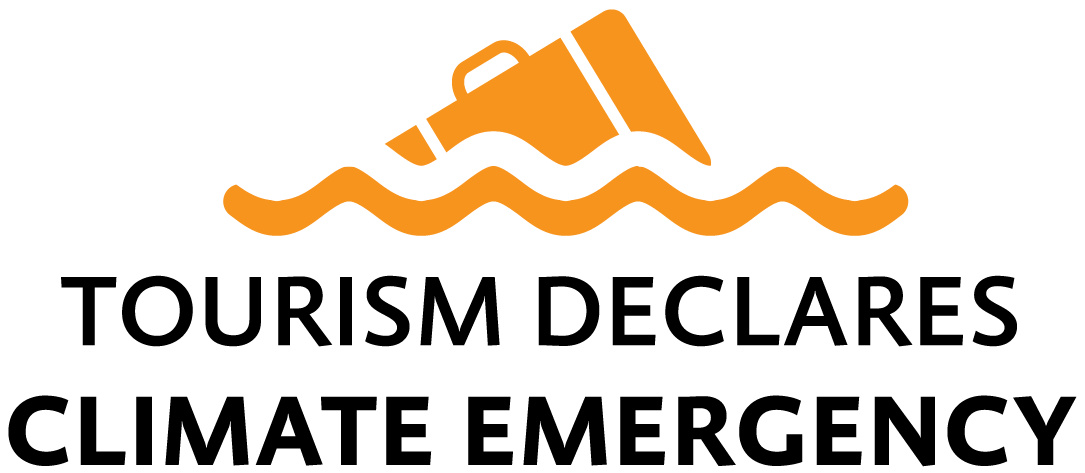Ideas for Climate Emergency Plans
Every signatory to Tourism Declares commits to publishing a Climate Emergency Plan within 12 months. Here are some initial ideas of what you might include.
Measure
Record and share information about your emissions as accurately and extensively as possible. We will be providing advice on the best tools and calculators for different types of tourism business soon.
Energy & Water
Change to a 100% renewable energy tariff
Generate your own electricity from renewable sources
When replacing bulbs and electrical devices, use the most energy efficient.
Provide rewards and incentives for low energy use by customers
Provide information on local energy issues
Minimise water use.
Travel & Transport
Provide information for clients how to take a bus or train to reach destinations.
Offer to book bus or train travel to reach destinations if the same service is offered for air travel
Provide information about which airlines and routes are most efficient
Use local public transport, buses and trains to transfer clients at the beginning and the end of the itinerary.
Reward clients who travel by public transport
Supply free bikes
Install an electric car charging point
Staff & Work
Only use FSC-certified or recycled paper
Switch to the Ecosia Web Browser
Facilitate team meetings and external meetings via conference call at every possible opportunity to reduce the need for physical travel
Operate a remote working policy where possible.
Join Climate Perks, a scheme for employers who wish to grant additional days to staff to enable them to travel on holiday overland, without ‘losing’ leave days for the travel time.
Turn down work that involves excessive flying, or seek alternative ways of working.
Combine multiple projects, conferences and/or personal travel together into one trip so as to reduce the number of flights required.
Support staff who wish to attend climate strikes, or whose children are striking.
Materials & Waste
Remove single-use plastics from your operations.
Reduce waste towards zero.
Use upcycled materials where possible.
Minimise or avoid packaging wherever possible.
Reuse as many materials as possible, or supply them to an organisation that reuses or repurposes materials into new products
Food & Drink
Provide vegetarian and vegan meals, and give tips advice on where to eat plant based meals when travelling.
Provide smaller portion sizes, significantly reducing food waste.
Reuse and repurpose uneaten food according to the food waste hierarchy.
Provide free clean drinking water and reusable bottles/cups to avoid use of disposable plastic bottles and cups.
Trips
Shift to suppliers using renewable energy
Develop trips that increasingly rely on walking, biking, hiking, kayaking etc that require no additional vehicle support.
Design trips to visit and showcase local climate initiatives or showcase local climate issues.
Information & communication
Document and record local stories relating to the climate crisis.
Commit to focussing regular customer communications to the Climate Crisis.
Facilitate clients being able to learn more about the issues facing the country they are exploring, and being able to give something back through the support of local charitable organisations and projects.
Provide walking maps and advice on local sustainable enterprises, restaurants etc
Provide advice and tips on how to be a more climate friendly traveller when in destination.
Include information about how to reduce emissions on your website.
Share what you learn about addressing the climate crisis with your local community.
Partners & suppliers
Encourage and enable current suppliers to adopt climate friendly practices, and include such criteria when choosing new ones.
Encourage suppliers and partners to make their own declaration
Connect with other Tourism Declares partners in your region and co-promote your trips and offers, providing information for guests on how to connect between both trips in the most sustainable way possible
Advocacy
Support local campaigns against airport expansion
Support campaigns for frequent flyer levies
Support calls for ending unfair subsidies for aviation
Support calls for ending aviation’s removal from fuel tax
Support efforts to subsidise cleaner forms of transport
Support efforts to develop clean aviation fuel
Support refugee and migrant initiatives in the countries where you operate
Finance*
*Your Climate Emergency Plan should describe how you will reduce your own, and your supply chain’s, emissions.
Financing others to take action on climate does not reduce your own emissions. Its role is temporary, to pay to draw down the equivalent of any remaining emissions that you have not yet been able to remove after implementing the measures in your Climate Emergency Plan.)
Donate percentage of revenues to fund conservation and re-wilding projects
Imposed a voluntary CO2 tax on yourself per customer, and invest it in sustainable energy projects.
Charge a climate levy to your guests to factor in the cost of their travel related emissions.
For those who choose to purchase offsets for their residual emissions, only use Gold Standard credits, and always communicate them as a short term way of compensating for those emissions you have not yet been able to remove.
More…
Most of these ideas come from our signatories declarations’ and climate plans. We will continue to add more as they appear and in time provide supporting background rationale, implementation guidance and best practice example for each idea.
Do you have any suggestions for solutions to add or ways to make our current ideas more effective? Please email us at info@tourismdeclares.com or use the form below.
